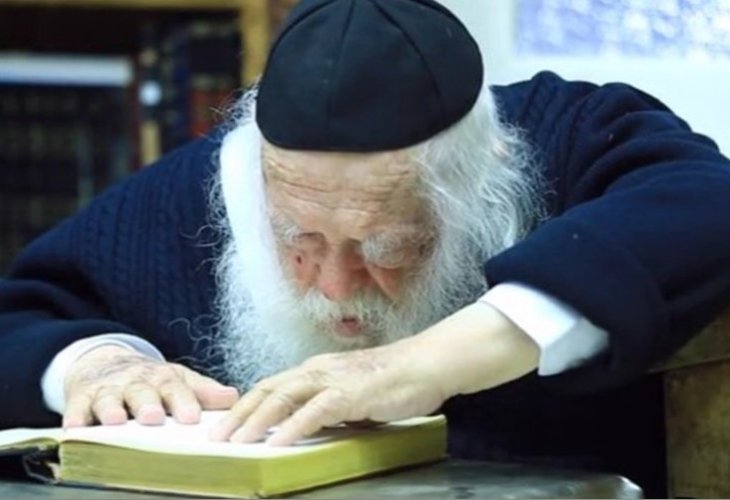Personal Stories
The Note She Wanted to Bring to Heaven
Her whispered prayer saved her in Auschwitz and now she wondered if it could follow her to the next world.
 Rabbi Chaim Kanievsky (Photo: David Zer)
Rabbi Chaim Kanievsky (Photo: David Zer)A deeply moving story was shared in Yated Hashavua about a courageous Holocaust survivor who lived with unshakable faith and who had a heartfelt question for Rabbi Chaim Kanievsky, one of the greatest Torah leaders of our generation.
The question was brought to Rabbi Kanievsky by his close student, Rabbi Eliyahu Mann, who shared the story with Yated Hashavua.
“I know exactly who this woman is,” Rabbi Mann began. “She’s a righteous woman who lives in England. Her faith in Hashem and in Divine providence is on a level I’ve only seen among truly great people. She is, thank G-d, still alive and well.”
Rabbi Mann then described what happened: “This special woman sent her son to Israel with a question for Rabbi Kanievsky. The son came to me and said, ‘I can’t bring myself to ask this question. Please, ask for me.’
“He explained, ‘My mother, may she live and be well, is a survivor of the Holocaust. As a young girl, she endured the horrors of Auschwitz, not once, but twice. She was forced into hard labor. After being transferred elsewhere, she was sent back again.
“‘She told me, “My dear son, I went through seven levels of hell. No words can describe what we experienced. I lost everyone and everything. And yet I somehow survived, body and soul.
“‘How did I survive? Because I knew I had a Father in heaven. I spoke to Him with a short prayer that was always on my lips. It’s the one we say on Mondays and Thursdays: ‘Look from heaven and see, for we have become a mockery among the nations… yet we have not forgotten Your name, please do not forget us.’
“‘Even when I saw death all around me, when I felt like we were being led like sheep to slaughter, I would whisper: ‘We have not forgotten Your name… please do not forget us.’ That tefillah (prayer) gave me strength, courage, and a reason to hold on.
“‘Eventually, the Americans came, Hashem’s messengers, and saved us. I survived. I built a family. But I know I won’t live forever. One day, I will leave this world and stand before Hashem.
“‘I have only one request, my son. After my 120 years, take a small paper and write on it: “We have not forgotten Your name… please do not forget us.” Place it in my hand. Just like I spoke to my Father in heaven with these words when I was on earth, I want to bring this prayer with me when I meet Him again. Maybe, just maybe, this will help me again in the World of Truth.
“‘But is it allowed? That’s what I want to ask the Rav.’”
Rabbi Mann brought this emotional question to Rabbi Kanievsky. The great sage listened quietly, and his eyes filled with tears.
“We have to check,” he said gently, “Is this a pasuk (verse) from the Torah or a tefillah (prayer)?”
He took a Tanach (Bible), flipped through it, and after a few moments said, “This is not a verse, it’s a prayer.”
“If it were a Torah verse, it would be forbidden to place it in the grave, because that would be considered disrespectful to the holiness of the Torah. But since this is a prayer, it is allowed.”
He continued: “Let them place it in a vessel within a vessel (a halachic method for respectful burial), and give it to her hand.”
Then Rabbi Kanievsky looked up and added something softly, in Yiddish: “Aber der Ribono Shel Olam darf nit kein tzetlach”—“But the Master of the Universe doesn’t need little notes…”
Rabbi Mann asked, “Should I tell her that? That Hashem doesn’t need notes?”
Rabbi Kanievsky answered, “No… don’t tell her that. If it gives her comfort, let her have her heart’s desire.”
Rabbi Mann then asked the Rav another question: “I once heard that when Rabbi Yechezkel Levenstein passed away, they carried his sefarim (holy books) after his bier. Rav Shach once said, ‘I won’t ask for my books to be carried, but I will ask for all the pashkevilim (public notices) written against me to be buried with me. And I’ll tell Hashem: ‘Look, Master of the Universe—I suffered disgrace for Your sake.’ Why do this if Hashem doesn’t need reminders?”
Rabbi Mann continued: “Rabbi Yehuda Segal of Manchester created a daily chart to learn two halachot (laws) about forbidden speech. He asked that one chart be placed in his hand when he passed away. That would be his ‘card’ to the next world. Again, if Hashem doesn’t need notes, why would these great tzaddikim (righteous ones) do this?”
He added, “Some scholars even asked that their coffins be built from the tables on which they learned Torah. Why, if Hashem doesn’t need anything physical?”
Rabbi Kanievsky responded: “It’s true. Hashem doesn’t need papers or tables or reminders. But when others hear these stories, they become inspired to learn more Torah, to be willing to suffer for Heaven’s honor, to guard their speech. That inspiration is the real merit that helps in the next world.”
(Adapted from Yated Hashavua, courtesy of the Dirshu website)

